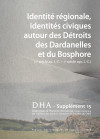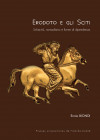
- Summary
-
The Achaemenid Persian Empire fascinates the Greeks, who perceive it in a very distorted way, and who do not understand how it works. In the 5th century BC, their observation fueled their political thinking, alongside the stasis, the term by which they designated the internal conflicts of their cities. In this double exercise, Herodotus, the Tragics and the Sophists think the political, and they prepare the birth of political theory in the following century. The debate on the best constitution proceeds from it: Herodotus projects it on the Persian conspirators of 522 (III, 80-82). The crisis which broke out that year in the Persian Empire was due to the fact that the succession of Cyrus, who died in 530 BC, was not settled, although he had designated his son Cambyse to succeed him. The latter probably compromised this process himself, by having his brother Bardiya eliminated, by deviating to this end the originally Babylonian ritual of the royal substitute, ignored by the Greeks as such, but transformed by them in a totally unconscious fashion. duplication and resemblance. The instrument of this scheme, the mage Gaumāta, had become Bardiya, by virtue of the ritual itself, and he claimed to reign in place of Cambyses even before his death, which appears to have occurred accidentally. Darius, probable cousin of Cambyses, overthrew the mage with 6 conspirators, to reign in turn, claiming to restore the dynastic legitimacy. The constitutional debate which precedes his advent in Herodotus is based on an elementary arithmetic constantly opposing the small number, reduced to the number one, a slightly larger number, but which remains limited, and the large number. This distinction is found between the monarchy, the power of one, the oligarchy, the power of a minority, and democracy, the power of the many. The Greeks apply it to the political field, while the Indian world distributed the Dumaian functions according to the same criterion. The Greek historiography of the Medieval and Persian kings is based on an equally tri-functional typology of inspiration, which reserves for each of them a role: founding king and organizer, warrior king, sovereign linked to the Third Function. This typology is not a rigid yoke, and it adapts to each of the kingdoms, and to each of the monarchs.
- Contents
-
Introduction
Penser le politique en Grèce ancienne : la loi du NombreL’invention du politique
L’héritage grec
L’empire perse et les Grecs
Chapitre I
L’empire du nombreI- Le paradoxe achéménide
1- Fascination et malentendus
2- L’ordre du discours
3- Conclusion
II- La crise de 522 dans l’empire perse
1- La succession de Cyrus
2- Le partage de la souveraineté
3- La jalousie du Grand Roi
4- L’image du roi et son double
5- Physiologie de l’hubris
6- Conclusion
Chapitre II
La meilleure constitutionI- Le complot des Sept
1- Une conjuration par cooptation
2- Le débat tactique
3- Les conjurés en action
4- Conclusion
II- Le grand débat : monarchie, oligarchie, démocratie
1- Le problème de l’authenticité du débat constitutionnel
2- Éléments d’arithmétique politique
3- Conclusion
Chapitre III
La typologie de la royauté mède et perseI- Le rôle du fondateur : Déiocès, Cyrus, et Darius
1 Le roi justicier : Déiocès
2 Fondateur et conquérant : Cyrus
3 Le refondateur : Darius
II- Le roi guerrier : Phraorte, Cyaxare, Cambyse et Xerxès
1- Phraorte et Cyaxare
2- Les colères du conquérant
3- La défaite du guerrier
III- La fonction vitale et la femme fatale : Astyage, Xerxès
1- Fécondité des filles et souveraineté
2- Les errements du vaincu
Conclusion générale
Bibliographie
- Author (s)
-
Alexandre TOURRAIXAlexandre Tourraix is professor emeritus of universities. His main research activities are focused on religion in ancient Greece and politics, in particular the political and cultural relations between Ancient Greece and the Near East.
- Readership
-
The book is mainly aimed at the scientific community, students and an audience interested in questions relating to antiquity.
- downloadable items
- Reviews and press reviews
- Support (s)
-
Publié avec le concours de l’Institut des Sciences et Techniques de l’Antiquité (UFC – EA 4011)












